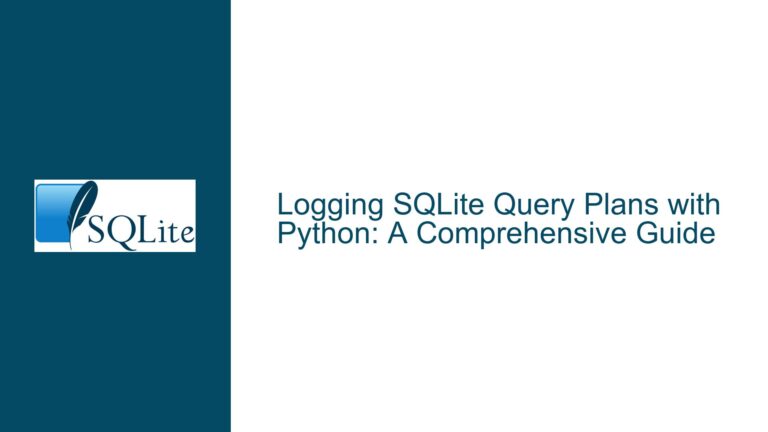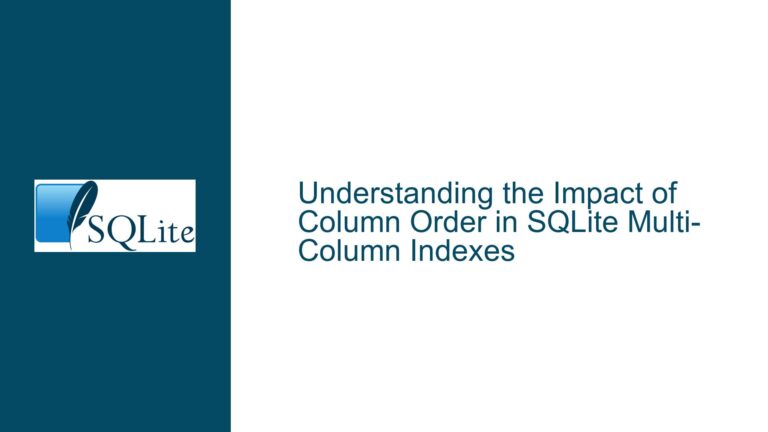Optimizing SQLite Queries with OR Conditions and Avoiding Query Plan Pitfalls
Slow Query Performance Due to OR Conditions in SQLite
When working with SQLite, one of the most common performance bottlenecks arises from queries that use OR conditions. These conditions can lead to suboptimal query plans, especially when the query involves joins and complex filtering. The issue becomes particularly pronounced when the query planner fails to leverage available indexes effectively, resulting in full table scans or inefficient index usage. In the case discussed, the query involves a LEFT JOIN between two tables, file and event, with a condition that uses coalesce or an OR condition to filter results. The query planner struggles to optimize this, leading to significantly slower performance compared to breaking the query into multiple parts using UNION ALL.
The core of the problem lies in how SQLite’s query planner handles OR conditions. When an OR condition is present, the planner often resorts to scanning the entire table rather than using an index, even when an index is available. This behavior is exacerbated when the OR condition spans multiple columns or involves complex expressions like coalesce. The result is a query that performs poorly, especially on large datasets.
Inefficient Query Plans and Index Usage with OR Conditions
The primary cause of the slow query performance is the query planner’s inability to generate an efficient execution plan when OR conditions are involved. In the example provided, the query SELECT file.id FROM file LEFT JOIN event ON file.id = event.file_id WHERE coalesce(event.new_name, file.name) = 'aaa.txt'; is slow because the query planner cannot effectively use the available indexes. Instead, it performs a full table scan on the file table and an automatic index search on the event table, which is inefficient.
The same issue occurs with the query SELECT file.id FROM file LEFT JOIN event ON file.id = event.file_id WHERE event.new_name = 'aaa.txt' OR (event.new_name IS NULL AND file.name = 'aaa.txt');. Here, the OR condition forces the query planner to evaluate both sides of the OR separately, leading to a full table scan on the file table and an inefficient index search on the event table. This results in a query plan that is significantly slower than breaking the query into two parts and combining the results using UNION ALL.
The query planner’s inability to optimize OR conditions is a known limitation in SQLite. While SQLite is highly efficient for many types of queries, it struggles with certain complex conditions, particularly those involving OR. This limitation is not unique to SQLite; other databases also face challenges with OR conditions, but SQLite’s lightweight nature and lack of advanced query optimization techniques make it more susceptible to these issues.
Rewriting Queries and Leveraging UNION ALL for Performance Gains
To address the performance issues caused by OR conditions, one effective strategy is to rewrite the query to avoid OR conditions altogether. In the example provided, breaking the query into two parts and combining the results using UNION ALL results in a significant performance improvement. The rewritten query SELECT file.id FROM file LEFT JOIN event ON file.id = event.file_id WHERE event.new_name = 'aaa.txt' UNION ALL SELECT file.id FROM file LEFT JOIN event ON file.id = event.file_id WHERE event.new_name IS NULL AND file.name = 'aaa.txt'; performs much faster because it allows the query planner to use indexes more effectively.
The key advantage of using UNION ALL is that it allows the query planner to generate separate execution plans for each part of the query. Each part can then leverage the appropriate indexes, resulting in a more efficient overall query. In the example, the first part of the query SELECT file.id FROM file LEFT JOIN event ON file.id = event.file_id WHERE event.new_name = 'aaa.txt'; uses an index on the event table, while the second part SELECT file.id FROM file LEFT JOIN event ON file.id = event.file_id WHERE event.new_name IS NULL AND file.name = 'aaa.txt'; uses an index on the file table. This approach avoids the full table scans and inefficient index usage that occur with the original query.
While rewriting the query using UNION ALL can improve performance, it is not always a practical solution, especially for complex queries with multiple joins and conditions. In such cases, other optimization techniques may be necessary. One approach is to use subqueries or common table expressions (CTEs) to break the query into smaller, more manageable parts. Another approach is to create covering indexes that include all the columns needed by the query, reducing the need for table scans.
In some cases, it may also be beneficial to analyze the query plan using the EXPLAIN QUERY PLAN statement to identify bottlenecks and optimize the query accordingly. For example, if the query plan shows that a particular index is not being used, it may be necessary to create a new index or modify an existing one to improve performance.
In conclusion, while SQLite is a powerful and efficient database engine, it has limitations when it comes to optimizing queries with OR conditions. By understanding these limitations and employing strategies such as rewriting queries using UNION ALL, using subqueries or CTEs, and creating covering indexes, it is possible to achieve significant performance improvements. Additionally, analyzing query plans and experimenting with different indexing strategies can help identify and address performance bottlenecks, ensuring that SQLite queries run as efficiently as possible.






